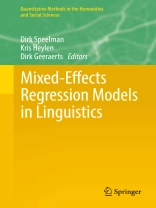When data consist of grouped observations or clusters, and there is a risk that measurements within the same group are not independent, group-specific random effects can be added to a regression model in order to account for such within-group associations. Regression models that contain such group-specific random effects are called mixed-effects regression models, or simply mixed models. Mixed models are a versatile tool that can handle both balanced and unbalanced datasets and that can also be applied when several layers of grouping are present in the data; these layers can either be nested or crossed.
In linguistics, as in many other fields, the use of mixed models has gained ground rapidly over the last decade. This methodological evolution enables us to build more sophisticated and arguably more realistic models, but, due to its technical complexity, also introduces new challenges. This volume brings together a number of promising new evolutions in the use of mixed models in linguistics, but also addresses a number of common complications, misunderstandings, and pitfalls. Topics that are covered include the use of huge datasets, dealing with non-linear relations, issues of cross-validation, and issues of model selection and complex random structures. The volume features examples from various subfields in linguistics. The book also provides R code for a wide range of analyses.
Зміст
Chapter 1. Introduction.- Chapter 2. Mixed Models with Emphasis on Large Data Sets.- Chapter 3. The L2 Impact on Learning L3 Dutch: The L2 Distance Effect Job.- Chapter 4. Autocorrelated Errors in Experimental Data in the Language Sciences: Some Solutions Offered by Generalized Additive Mixed Models.- Chapter 5. Border Effects Among Catalan Dialects.- Chapter 6. Evaluating Logistic Mixed-Effects Models of Corpus-Linguistic Data in Light of Lexical Diffusion.- Chapter 7. (Non)metonymic Expressions for Government in Chinese: A Mixed-Effects Logistic Regression Analysis.
Про автора
Dirk Speelman is associate professor at the department of linguistics at the KU Leuven. Dirk’s main research interest lies in the fields of corpus linguistics, computational lexicology and variational linguistics in general. Much of his work focuses on methodology and on the application of statistical and other quantitative methods to the study of language.
Kris Heylen is a research fellow at the research group Quantitative Lexicology and Variational Linguistics at the University of Leuven (KU Leuven, Belgium) and research fellow at the Institute for the Dutch Language (INT, Leiden, The Netherlands). He specialises in the corpus-based, statistical modelling of lexical semantics and lexical variation.
Dirk Geeraerts is professor of linguistics at the University of Leuven, where founded the research unit Quantitative Lexicology and Variational Linguistics. His main research interests involve the overlapping fields of lexical semantics and lexicology, with a specific descriptive interest in social variation, a strong methodological commitment to corpus analysis, and a theoretical background in Cognitive Linguistics.












